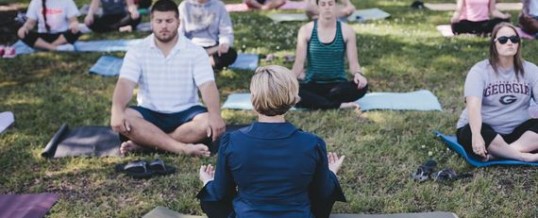
by Kate Hendricks Thomas, PhD, MCHES
I used to think strength meant presenting an image of strong silence and always looking like I had everything together. I was a Marine, a leader, and could never make a mistake.
I became a Marine to serve, and loved being part of the Corps. As with anything I have ever loved intensely, the military changed and shaped me. To the casual observer looking in, the world seems brutal and intense. That outsider view isn’t entirely wrong—the military is some of those things. Shared hardship and challenge are vital parts of the refining and rebuilding process that changes a civilian into a warrior. If you ask anyone who served, they wouldn’t have it any other way.
After nine years in the Marines, I was a card-carrying member of warrior culture. Today, I remain proud of that credential. Looking back with the wisdom of hindsight, however, I realize that as a pretty decisive person with limited ability to ask for help and zero trouble taking risks, there were too many points at which I could have become a statistic.
Here’s one statistic to contemplate: In 2012, the US military lost 295 soldiers, sailors, airmen, and Marines in combat in Afghanistan. But over this same time period, 349 took their own lives.
Today, we continue to lose more military-connected personnel to suicide than to combat. As a veteran who understands warrior culture from the inside out, my current mission is to change it in ways that will enable our vets to not simply survive, but thrive.
Yoga: Authenticity, Healing, Resilience

I came to yoga as an athlete looking for something fun to try, something new to master, and something to help me bend my unyielding muscles a bit more easily.
What I found on the mat changed my life entirely. I found a practice that was about more than my body and my training. This was something I could practice and study while joyously never “mastering.”
Our bodies were made to move in constant search of unity with our minds and spirits. It’s a natural stillness that those who have felt it love, pursue, and fight to regain if lost.
When we discuss the sorts of trauma and injuries our veterans have experienced, we need to bring yoga and mindfulness into the conversation around treatment and prevention. Pills and therapy are not enough to return this active, passionate community to full health after trauma. We won’t seek them out and we won’t ask for help.
As a Marine, I know: The default mindset in warrior culture is “you can keep your couch.”
I’ve come to realize, however, that an honest leader can be real about where they don’t have it all together. What if I had completed training designed to increase self-awareness and promote resilience? What if PTSD was something I knew to look for in myself and others, rather than ridicule as the province of the malingerer?
The answer to our ongoing crisis in veterans’ health has to lie outside the contemporary standard of care. Yoga has invaluable tools to offer, and must be part of any new paradigm.
While clinical health services exist for soldiers and Marines with existing mental health conditions like post-traumatic stress, they are not stemming the rising tide of service suicides. Framing mindfulness training as a way to “bulletproof your brain” renders the practices palatable within the confines of warrior culture.
Marines and soldiers are competitive people who respond much better to notions of challenge than to victim or patient identities.
I teach yoga because it asks the practitioner to work at creating mental fitness and resilience, and I know no other way to reach my peers with such effect.
ShareJUN
2019

About the Author: